Besides opening up the possibility of a policy that allows vintage cars retrofitted with electric batteries to ply on roads, this also gives a clue to how cars older than 15 years that are banned can be valued again by a similar conversion to EVs, says Ritwik Sharma.
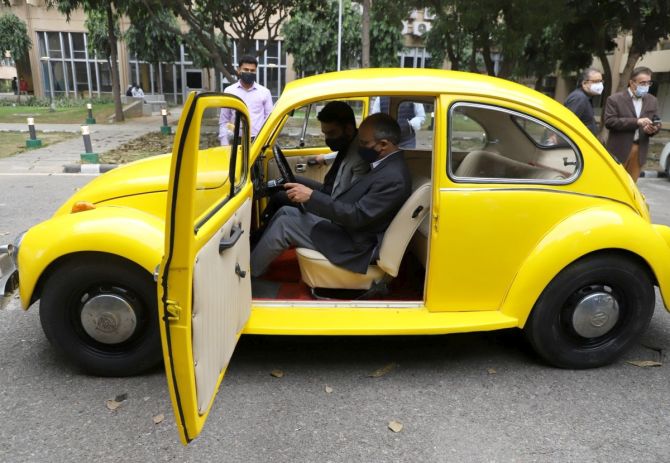
On a recent afternoon, a venerable old “Bug” glided around the administrative block of the Indian Institute of Technology (IIT), Delhi.
For a handful of vintage car aficionados who had gathered, this was a Bug -- as the iconic Volkswagen Beetle is fondly called -- that crept up a surprise unlike any.
The canary yellow Beetle, a 1948 model, is the first vintage car in India to be converted into an electric vehicle (EV).
The two-door sedan, with its curvy roof and just enough space for four adults, sported no visible difference in its new avatar, except for the absence of any revving sound as its petrol engine got replaced by an electric motor, and the addition of a panel of switches next to the gear lever inside.
Unlike for bystanders, those taking a ride would hear the steady hum and whir of the motor and the flywheel accompanied by mild creaks and groans one would expect from a septuagenarian car.
The Centre of Excellence for Research on Clean Air (CERCA) at IIT Delhi is behind this test case to promote electric mobility.
The electric Beetle is “a symbolic action to demonstrate that we can take actions to eliminate air pollution in Delhi NCR (National Capital Region) and in India by use of technology and innovation,” CERCA founder Arun Duggal said in a statement.
Because of the restrictions on the use of vintage cars in the capital, Duggal, an alumnus of IIT Delhi, thought of the possibility of replacing the petrol (internal combustion) engine with a clean electric engine in such vehicles.
The vintage Beetle was given for conversion by his friend Manjit Rajain, executive chairman of Tenon Group of Companies.
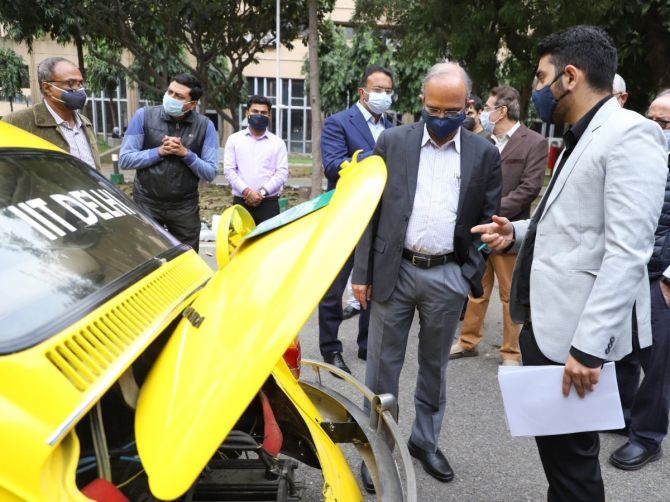
The car had an air-cooled petrol engine mounted on the rear. Jawaad Khan, an engineer, removed the engine and replaced it with an electric motor, controller, batteries, a battery management system and other EV components.
The project was started just before the pandemic struck, which delayed what would otherwise have been completed in two months, said Khan, who graduated a month ago from Maharaja Ranjit Singh Punjab Technical University in Bathinda.
“About 70 per cent of the new components were locally made. Such conversions of old cars into EVs will also boost local firms,” added Khan, who is part of a retrofitting start-up.
The Beetle now has a 48V 100Ah battery. On full charging, it can run up to 50-60 km. “The conversion cost over Rs 400,000, and we are working on using an artificial sound system and wireless charging,” added Khan. The mileage would increase depending on the size of batteries.
Although it is a first-of-its-kind experiment, it wasn't a laborious one, said Hemant Kaushal, head of CERCA, which is planning to similarly convert a vintage Austin that has been lying on campus.
“You just need a battery and a motor, and you have to take out the engine. The crankshafts have to be coupled with the motor, which is run by a battery. That's it.”
Besides opening up the possibility of a policy that allows vintage cars retrofitted with electric batteries to ply on roads, this also gives a clue to how cars older than 15 years that are banned can be valued again by a similar conversion to EVs.
“They will have value, save costs for users, and protect the environment from air pollution, unlike petrol or diesel cars,” added Kaushal.
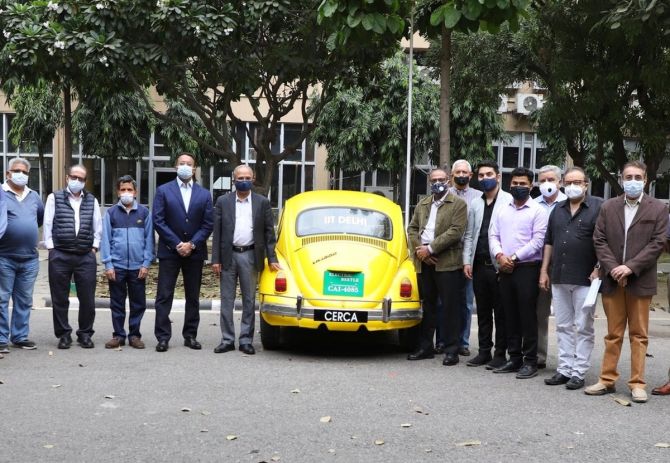
Two years ago, the Supreme Court banned 15-year-old petrol and 10-year-old diesel vehicles from plying in Delhi-NCR, in agreement with a 2015 order of the National Green Tribunal.
Diljeet Titus, general secretary of the Heritage Motoring Club of India, pointed out that vintage cars were exempted from the ban on the condition that they have to be more than 50 years old.
“But the question is, what about cars manufactured after 1970?” he said, adding that a lot of cars that are less than 50 years old are good candidates for being converted to EVs.
“As collectors, that is welcome because we are able to enjoy these cars, which we otherwise can't, and there is pride of ownership of a car that is not polluting the environment.”
According to Titus, under the Antiquities and Art Treasures Act of 1972, vintage cars are protected objects that are prohibited from being exported.
“The government has recognised that vintage cars are part of our national heritage, so they need to be protected,” he said.
Retrofitting more recent cars, he argued, would also help many, including senior citizens and pensioners -- particularly if costs of conversion were brought down.
The Beetle has certainly floated such hopes, within and beyond IIT Delhi.
Vintage power
- Air-cooled petrol engine replaced with electric motor, controller, batteries, battery management system, other EV components
- The Beetle now has a 48V 100Ah battery, which can run up to 50-60 km on full charging
- Mileage would increase depending on the size of batteries
- The conversion cost over Rs 400,000
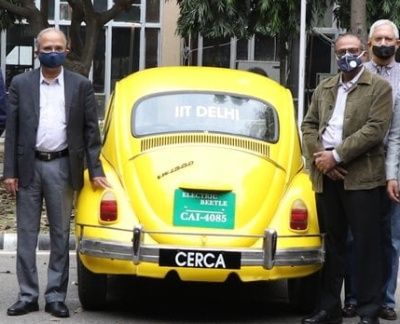
Feature Presentation: Rajesh Alva/Rediff.com


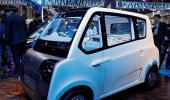

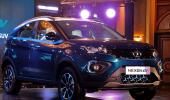
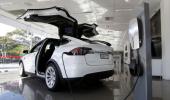






 © 2025
© 2025